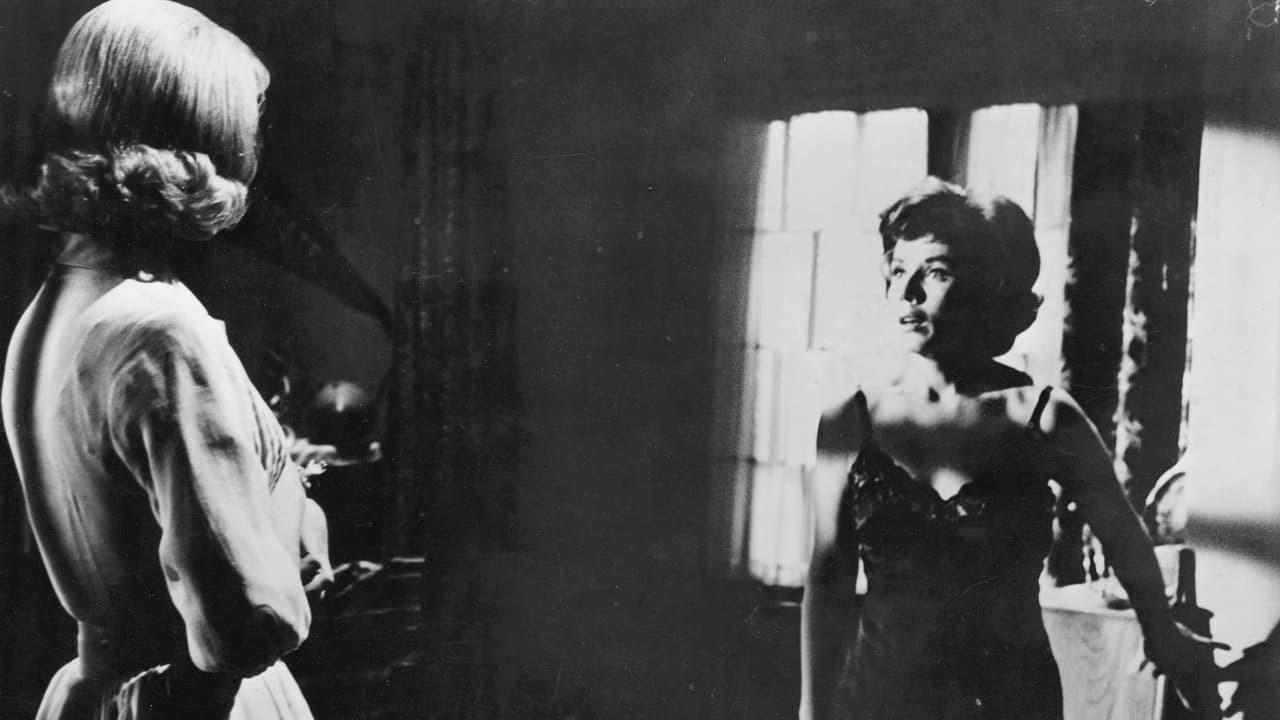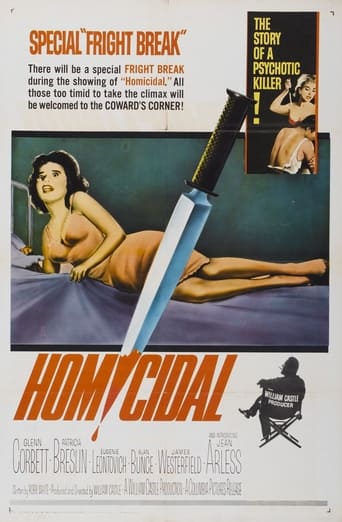

The aptly-titled "Homicidal" follows a mysterious woman, Emily (Jean Arless) who is caregiving for the former guardian/mother figure of her new husband, Warren, in a small California town. Warren's half-sister, Miriam (Patricia Breslin) finds her off-putting, but Emily's role in a savage random murder exposes a well of family secrets.In all frankness, William Castle was a relatively conventional filmmaker—he lacked the raw intuition and ingenuity that truly great filmmakers tap into. I wouldn't call him a hack, but his films certainly lack the finesse that makes all the difference between a "good" movie and a "great" movie. But what Castle lacked in innovation, he made up for in showmanship. "Homicidal" is probably a standalone example of his film crafting abilities at their highest peak; this is the best he ever was, and it's actually pretty darn good.The film has gone down in history as the ultimate "Psycho" ripoff, and that's an accusation that's hard to dispute. It really is like "Psycho 2.0: The B-Movie Version." One can see Castle riffing on Hitchcock's classic in nearly every scene of the film, and yet it's difficult to completely write it off—partly because it's generally well-crafted, and partly because it is legitimately engaging. The film does a fantastic job at capturing its audience's intrigue, and even if you have an inkling about where it's all headed, the urge to stick along for the ride is ever present.The film veers away from Hitchcock territory in its camp factor, as well as its overt violence. There are two keynote scenes in the film that are still violent by today's standards, so I can only imagine the audience reaction in 1961. Castle doesn't shy away from the grit here, and it's these moments that really reinforce to the audience that what they're seeing is in fact a horror film. A memorable performance from Jean Arless as the mysterious lead amps up the fun here, and Patricia Breslin is darling and innocent, playing up the heroine-in-trouble role. The film also boasts a great California Gothic vibe that makes the film extremely visually appealing.Overall, I found "Homicidal" to be a fairly competent horror film, and most definitely Castle's most intricate and well-plotted film. It's not Hitchcock, let's be clear—but it is a gimmicky, violent, and well-crafted homage to the king of suspense—a love letter, if you will, from the king of movie theater hi jinx. It is certainly not high-brow cinema, but it is certainly as high as William Castle ever made it as a director. Check your inhibitions at the door. 8/10.
... View MoreIt might not be on the level of Les Diaboliques but I thought this was a surprisingly good mystery and psychological thriller. After the energetic start I thought it would be a roller-coaster. Instead I got much more of a psychological game between the numb wheelchair bound Helga and her caretaker Emily and on the other side between Miriam and her half-brother Warren. There was something not right about Warren I thought right from the start and I had a feeling he was planning something evil together with Emily. I guess I was partially right even though I didn't expect that one of the two didn't really exist (and not going to say who). It certainly had a Psycho feeling but I thought Homicidal was more clever and had better character development. I have to applaud actress Joan Marshall/Jean Arless for pulling of such a stunt!
... View MoreFirst of all, if one adamantly holds that Homicidal is a Psycho knockoff and Castle is a Hitchcock wannabe, then take a fright break and do your historical research because neither holds up against the facts. That being said, Castle is no Hitchcock, but personally I believe Homicidal is a better film than Psycho (it is my least favorite Hitchcock I might add, and I've seen only about a dozen). Homicidal is fresh in its sexual politics, whereas Psycho is traditional (one could say the former adds to post-structuralist discourse while the latter adds to structuralist discourse). Homicidal introduces the transvestite as a conscious chooser, as opposed to Bates who is wracked with psychological strife. Bates cannot express his intentions honestly even when being upfront, whereas the Emily character of Homicidal appears to have plans for everyone. I couldn't help but feel this character was so well developed that they might have a sexual political manifesto tucked away in their study, just waiting for the twenty-teens when it could be published and hailed as a Constitution of Rights and Freedoms for the hard-done-by and misunderstood. The story does not get by on a self-piteous treatment, but that sentiment is at the core of all its characters. Psycho, thematically, is a mere anachronistic blip in comparison. In fact, the rhetoric of Psycho has DSM written all over it (hopefully one day we just throw that thing out and start again). Did the PCA get in Hitchcock's way? Not at least in the expression of currency of sexual politics as the PCA's greatest problems were with a "torrid" love-making scene in the opening sequence and with references in the dialogue to incestuous relations of Bates and his mother. This is old hat. Homicidal provokes a hetero-normative anxiety that Psycho never could - the anxiety regarding the formation and presence of self-sufficient and full independent non-hetero-normative persons. Herein lies the terror of this film because if you don't like Bates running around stabbing people, you just lock him up and throw away the key, but Emily in the same situation would find a way to persuade a new key to be made. She shows rational agency and cunning resourcefulness. Norman's secrets scream out at the audience "I like panties and I don't know why!", but Emily has a very different motivation and it is clearer (to her at least). To the hetero-normative audience this clarity of motivation is insidious and sinister. Castle and White are clearly attuned to a more developed understanding of "fringe" sexuality and radical sexual politics. I digress and my reviews rarely end up so tangential and polemical. As for the independent analysis of Homicidal, the opening sequence tells a lot. Castle provides another prologue, this time hailing his own previous films and thus interpellating his audience into the Castle 'brand'. The milieu is urban, the time of day is high noon... not characteristic of Castle branded horror. As the characters drive out to the suburbs at night things are getting more familiar. The wedding scene is bizarre, unpredictable and establishes an erratic pace that will be forgiving to the plot points as they come up. There is good characterization and performance as we land back in a small shadowy town. The voice-dubbing is good, but not uncanny. That being said, the odd synchronicity works well on the denial of a culture only just becoming aware of the new voices to be represented in its society. There are some amusing allusions when the knife sharpener shows up. The final sequence is accompanied by a 'fright break'. There is a clock superimposed onto the frozen frame on the screen. A heart is heard beating. A voice-over announcer directly addresses the audience regarding the opportunity to leave the theatre for fear of fright. This gimmick appears to be well connected to Psycho and Hitchcock's own gimmick for the exhibition of his film (he wouldn't let anyone come into the theatre after it started playing). For Castle, the one-upmanship was a disaster waiting to happen. Ironically, his own ego could not support the idea of not only competing to create a great gimmick related to his film but to have it as an apt counterpoint to another film/gimmick combination. He was suffering from his own genius imagination and the nature of the industry at the time and all in the worst possible way. Coward's corner was the resultant gimmick for releasing the pressure and sadly it was a place for Castle more than anyone else. I think he would soon realize that. That being said, the final shot of the film provides great insight and a moral lesson (seldom part of Castle films). A well directed effort by Castle and a brave, powerful film that will inevitably withstand the test of time (but not the scorn of Hitchcockites).
... View MoreCall it inspiration or homage or ripoff, this is clearly influenced by PSYCHO from the previous year. Whether Castle was capitalizing on that film's success or simply knew a good idea when he saw one, the similarities are all too obvious. Castle's take on it has some ludicrous stuff in it, but is a ton of fun. The film really keeps you guessing for the first half, you're dying to know the story behind Joan Marshall's (here credited under the alias Jean Arless) ruthlessly psychotic behavior. There's a final reveal that's telegraphed far too early (who knows, it may have fooled 1961 audiences) but it hardly matters when it's all so giddily twisted and enjoyable. Marshall is a delight and the film has pretty good production value. The score is well done, and although Burnett Guffey's cinematography isn't as striking as his noir work, there are some terrific shots. On, and the gimmick this time around? A "Fright Break" clock that counts down 45 seconds before the climax, giving scared viewers a chance to go out in the lobby and stand in the "Coward's Corner." Hee hee! Definitely one of the better Castle productions, one that makes you wish there was someone of his showmanship making movies today.
... View More